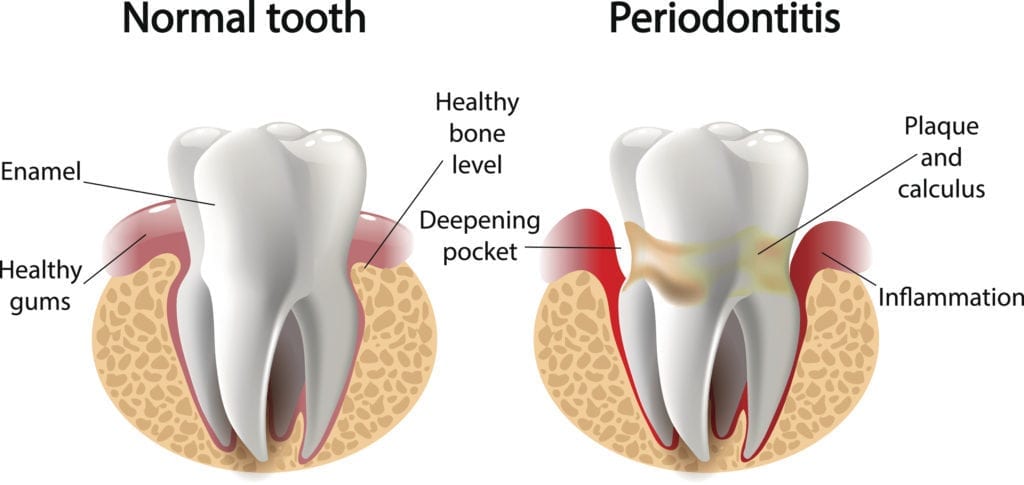Why do my gums bleed when I brush or floss my teeth?
Bleeding gums are typically a sign of gum disease. It is one of the dental concerns that Fuller Dental treats in Burlington, NC. If your gums bleed daily, schedule a visit with your Burlington, NC dentist as soon as you can. Gum pain, sore gums, and gums that bleed often are present in patients with gingivitis, an early stage of gum disease.
By the time patients show signs of bleeding gums, the disease-causing bacteria have already begun to spread, causing damage to your oral health. Fuller Dental provides periodontal therapy to treat the varying stages of gum disease.
What Causes Gum disease?
The spread of harmful bacteria in your mouth causes gum disease. This bacteria leads to the build-up of tartar and plaque on your teeth and gums. Disease-causing bacteria multiply and spread, then enter the bloodstream. Gum disease has been linked to various health conditions and systemic diseases.
As a progressive disease, your dentist will address periodontal disease as early as possible. This will avoid the development of more complex health concerns. Visiting the dentist twice a year can help your dentist spot gingivitis early for conservative treatment.

Gum disease is a common dental health concern that often goes undiagnosed until the later stages of the disease. The bacteria will likely form pockets in the gum line when the gums bleed. Inflammation and gum recession are also common during this phase. As the bacteria spread, gums can pull away from the teeth, causing tooth decay, loss, and bone loss.
Other Reasons Gum Bleed
Bleeding gums commonly flare up due to hormone changes. Pregnant patients should visit the dentist during their pregnancy to monitor the health of their gums. Pregnancy gingivitis is common. You can avoid it by being proactive with your oral hygiene. Pregnant women should continue to brush and floss but be extra cautious around sensitive gum tissue to prevent bleeding.
It is important to maintain routine visits to our Burlington, NC dentist office during pregnancy to monitor gum health. We suggest using a soft bristle toothbrush and keeping a routine of flossing to avoid bleeding gums.
There are several other causes of bleeding gums. This includes aggressive flossing and brushing, dentures that do not fit correctly, and certain medications.
Treating Gum Disease
If you notice your gums bleeding, swollen, or tender to the touch, contact your dentist. Fuller Dental offers custom dental care for your dental health concerns, including treatment plans for gum disease. We may recommend extra dental cleaning, anti-bacterial rinses, scaling, and root planing to help treat your periodontal disease.
Bleeding Gums FAQS
If your gums are bleeding regularly, you should be seen by a dentist. Learn more about bleeding gums and what may develop by reading the answers to these frequently asked questions.
When should I be worried about bleeding gums?
Almost all of us will experience bleeding gums at least once. If you use a hard-bristled toothbrush or brush incredibly hard, that can make your gums bleed occasionally. But if you notice that your gums bleed almost every time you brush your teeth, you must get them looked at. Regular gum bleeding is the most prominent symptom of the early stages of gum disease.
What happens if I don’t get treatment for bleeding gums?
Like most health conditions, the longer you go without treatment, the more extensive the condition becomes. Bleeding gums are one of the few signs of early gum disease, as it usually is hard to detect. Gingivitis is the earliest form of gum disease and the only treatable one. Not getting treatment makes the condition more severe, and it reaches a stage where you can’t treat the disease, only manage it.
Should I continue to brush my teeth if my gums are bleeding?
Yes, it’s even more important if your gums are bleeding. Bleeding gums mean gum disease, and thorough brushing and flossing are some of the best ways to manage the condition. You must remove debris and bacteria from the gums, especially if pockets have formed. The dentist may even suggest that you brush more than normal.
Can bleeding gums spread?
Bleeding gums are caused by bacteria and inflammation in the gum tissues. Your gum tissue is open, and those bacteria can enter your bloodstream, taking them throughout your body. They cause problems in other areas of your body, like your heart and lungs. It’s important to manage the bleeding gums before they reach this point.
Can my gingivitis spread to others if I kiss them?
Yes, this is possible. When you’re kissing, you’re exchanging saliva. If yours is riddled with bacteria due to gum disease, these bacteria can travel into the other person’s mouth. It’s best to avoid kissing someone until you get your condition under control.
Can stress cause bleeding gums?
Stress can cause problems throughout your entire body, including your mouth. Stress puts you at a higher risk for gum disease. You’re less likely to brush and floss regularly if stressed and worried about other things. Oral hygiene gets put by the wayside. You’re also more susceptible to disease, as stress weakens your immune system.
Schedule A Dental Exam Today
Our dental care team helps to restore your smile by addressing dental concerns from common to complex. From whitening discolored teeth to repairing damaged or missing teeth, our dental care team can help you enjoy a more beautiful, healthy smile.
If you are looking for a compassionate, highly trained, and experienced dental health care team in the Burlington, NC region, contact Fuller Dental or request an appointment online today.
